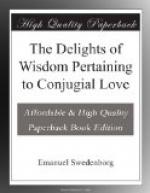and acknowledge the love of the other, so that when
they meet they may unite of themselves? Who can
love what is not love? Is not conjugial love
alone mutual and reciprocal? If it be not reciprocal,
does it not rebound and become nothing?” On hearing
this, I asked the two angels from what society of
heaven they were? They said, “We are from
the heaven of innocence; we came infants into this
heavenly world, and were educated under the Lord’s
auspices; and when I became a young man, and my wife,
who is here with me, marriageable, we were betrothed
and entered into a contract, and were joined under
the first favorable impressions; and as we were unacquainted
with any other love than what is truly nuptial and
conjugial, therefore, when we were made acquainted
with the ideas of your thought concerning a strange
love directly opposed to our love, we could not at
all comprehend it; and we have descended in order
to ask you, why you meditate on things that cannot
be understood? Tell us, therefore, how a love,
which not only is not from creation, but is also contrary
to creation, could possibly exist? We regard
things opposite to creation as objects of no value.”
As they said this, I rejoiced in heart that I was
permitted to converse with angels of such innocence,
as to be entirely ignorant of the nature and meaning
of adultery: wherefore I was free to converse
with them, and I instructed them as follows:
“Do you not know, that there exist both good
and evil, and that good is from creation, but not evil;
and still that evil viewed in itself is not nothing,
although it is nothing of good? From creation
there exists good, and also good in the greatest degree
and in the least; and when this least becomes nothing,
there rises up on the other side evil: wherefore
there is no relation or progression of good to evil,
but a relation and progression of good to a greater
and less good, and of evil to a greater and less evil;
for in all things there are opposites. And since
good and evil are opposites, there is an intermediate,
and in it an equilibrium, in which evil acts against
good; but as it does not prevail, it stops in a conatus.
Every man is educated in this equilibrium, which,
because it is between good and evil, or, what is the
same, between heaven and hell, is a spiritual equilibrium,
which, with those who are in it, produces a state of
freedom. From this equilibrium, the Lord draws
all to himself; and if a man freely follows, he leads
him out of evil into good, and thereby into heaven.
The case is the same with love, especially with conjugial
love and adultery: the latter love is evil, but
the former good. Every man that hears the voice
of the Lord, and freely follows, is introduced by
the Lord into conjugial love and all its delights and
satisfactions; but he that does not hear and follow,
introduces himself into adulterous love, first into
its delights, afterwards into what is undelightful,
and lastly into what is unsatisfactory.”




